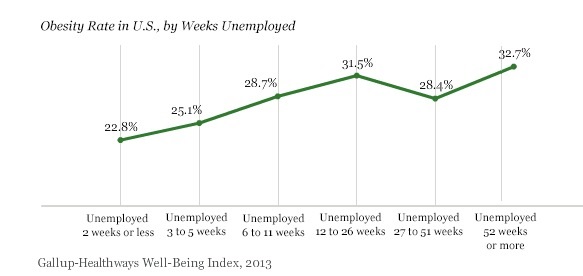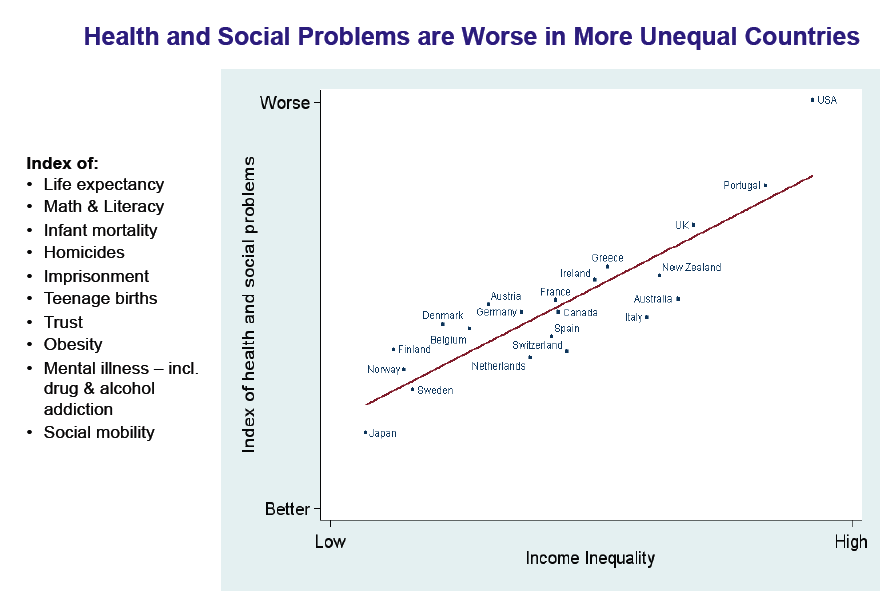
Gallup released the results of a survey based on interviews in 2013 of 5,000 long-term unemployed and 13,000 short-term unemployed.* Gallup highlighted that obesity is higher among the long-term unemployed:

The long-term unemployed are also twice as likely to say they have high cholesterol and high blood pressure. However, the pollster warns against jumping to the conclusion that high unemployment led directly to worse health. Indeed, the short-term unemployed report a lower incidence of these two ailments by virtue of being young: average age of the short-term unemployed is 33.6 years versus 42.6 for the worker pool overall.
It’s appealing to assume that correlation means causation. It isn’t hard to imagine that someone who is unemployed will wind up gaining weight due to the ready proximity of the fridge and to shifting their diet to cheaper foods, which are often higher fat and/or higher simple carbohydrates. Gallup points out that people who are in worse overall health may find it harder to land a job. Curiously, they don’t mention the most obvious reason that the long-term unemployed have higher rates of obesity: that the obese are discriminated against. For instance, at Harvard Business School, the student that the school chose as its graduation speaker for the class of 2013, Brooke Boyarsky, began her talk by stating: “I entered H.B.S. as a truly ‘untraditional applicant’: morbidly obese.” And what was her self-described act of courage at the school? Not graduating as a Baker Scholar, but losing 100 pounds during her second year of study.
Gallup points out that either unemployment itself or poor health can lead to a self-reinforcing downward spiral:
Unemployment may cause some people to engage in behaviors that lead to health problems, while pre-existing health conditions may make it harder for others to find and keep work. For many individuals, both dynamics may be at work, perpetuating a negative cycle of declining job prospects and worsening health.
Jobless Americans may be more likely to fall into such a cycle if a higher incidence of health problems hinders their efforts to find a good job.
Over the longer term, one of the most worrisome implications of these relationships is that many of those who have been unemployed for a prolonged period may suffer chronic health problems even if they successfully re-enter the workforce. A 2009 study of Pennsylvania workers laid off in the 1970s and 1980s found that even 20 years later, these workers were 10% to 15% more likely to die in a given year than those who had not suffered a job loss.
This is yet another reminder of the high social cost of inequality and lack of access to decently paid work is a big part of the problem. As we wrote in 2010:
Severe financial crises result in a permanent decline in the standard of living. For some citizens, that has come through contracts being reneged, in particular, pension cuts. Other people see their savings in tatters and have no realistic prospect for being able to fund their retirement. And for many of these individuals, the odds of finding continuing, reasonably paid work are low. Even before unemployment soared, people over 40 face poor job prospects. The idea that the middle aged cohort can earn back losses to their nest eggs is wishful thinking. And the young are not much better off. New graduates also face a hostile job market. Worse, students often went into debt to finance their education, believing the mantra that it was an investment.
And many of the societies suffering these financial shocks have already suffered a great deal of erosion of their underlying support structures. Even before the crisis, in the US and other advanced economies, social bonds have eroded in a remarkably short period of time, roughly a generation and a half. Job tenures are short; employees and employers have little loyalty to each other. Ties to communities are weak. Many families have two working parents, so career and parenting demands leave little time to participate in local organizations. Advanced technology frequently offers an easier leisure outlet than trying to coordinate schedules with time (or financially) stressed friends. But marriage and families are also not the haven they once were, given high divorce rates.
One oft unrecognized factor is that alienation and social stress are directly related to income inequality. This is hardly a new finding, but it seldom gets media coverage in the plutocratic US. And it has concrete, measurable costs. As Michael Prowse explained in the Financial Times:
…..if you look for differences between countries, the relationship between income and health largely disintegrates. Rich Americans, for instance, are healthier on average than poor Americans, as measured by life expectancy. But, although the US is a much richer country than, say, Greece, Americans on average have a lower life expectancy than Greeks. More income, it seems, gives you a health advantage with respect to your fellow citizens, but not with respect to people living in other countries….
Once a floor standard of living is attained, people tend to be healthier when three conditions hold: they are valued and respected by others; they feel ‘in control’ in their work and home lives; and they enjoy a dense network of social contacts. Economically unequal societies tend to do poorly in all three respects: they tend to be characterised by big status differences, by big differences in people’s sense of control and by low levels of civic participation….
Unequal societies, in other words, will remain unhealthy societies – and also unhappy societies – no matter how wealthy they become. Their advocates – those who see no reason whatever to curb ever-widening income differentials – have a lot of explaining to do.
Yves here. If you look at broader indicators of social well being, you see the same finding: greater income inequality is associated with worse outcomes. From a presentation by Kate Pickett, Senior lecturer at the University of York and author of The Spirit Level, at the INET conference in April:
(Click here to enlarge).
Note in particular where Japan sits on the chart. Some readers have argued that the US has little to fear from deflation and a protracted period of near-zero growth, since Japan is orderly and prosperous-looking, despite its relative decline. But Japan was and is the most socially equal major economy, and during its crisis, it observed the [Simon] Schama prescription of sharing the pain. The US, the UK, and to a lesser degree, Europe, have done the exact reverse, with both the bank rescues and austerity measures effectively a transfer from ordinary citizens to financiers.
Back to the current post. In a society driven by an ideology of selfishness and short-sightedness, many at the top find it easy to rationalize business and social policies that increase the ranks of the unemployed and leave them and other lower-income people with inadequate health care as pro-efficiency, or worse, somehow virtuous. The irony is that the rich pay for inequality through the toll on their own health and longevity.
Join us in defending the truth before it’s too late
The future of independent journalism is uncertain, and the consequences of losing it are too grave to ignore. To ensure Truthout remains safe, strong, and free, we need to raise $29,000 in the next 36 hours. Every dollar raised goes directly toward the costs of producing news you can trust.
Please give what you can — because by supporting us with a tax-deductible donation, you’re not just preserving a source of news, you’re helping to safeguard what’s left of our democracy.

